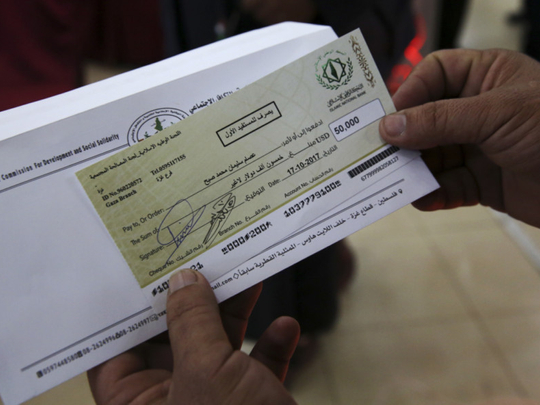
Beit Lahiya: As the rival Palestinian factions Fatah and Hamas begin to reconcile, families of loved ones killed in Gaza’s civil war a decade ago are also learning to get along.
With the backing of an exiled former Palestinian security chief, grieving families are agreeing to drop their 10-year-old blood feuds in exchange for $50,000 (Dh183,645) payments.
The idea is to help Gaza move beyond one of its darkest chapters — the weeklong round of internecine fighting that ended with Hamas’ takeover of the territory in 2007.
More than 700 Palestinians were killed in the infighting between the Fatah and Hamas factions, which was characterised by pitched gun battles on Gaza’s streets and scenes of people being thrown off the rooftops of high-rise buildings.
In this conservative society, family feuds are perhaps the biggest threat to the social fabric.
Organisers hope that working at the local level can help on the broader political level as well.
“By doing this, we end rancour among families,” said Majed Abu Shamalla, a Fatah lawmaker.
“We end a cycle of blood and revenge and this can lead to a real political reconciliation. Without ending this, the political reconciliation between the Palestinian factions can’t be achieved.”
When Khalil Al Anqah, a new recruit in the Hamas police force, was killed by a roadside bomb in 2007, Hamas blamed Fatah for the explosion and his family vowed to retaliate.
But recently, the family dropped its plan to avenge his death.
They were among hundreds of people who attended a reconciliation ceremony held at a wedding hall in the northern Gaza town of Beit Lahiya.
After a reading from the Quran and speeches by local officials, a representative from each family was called to the stage, shook hands with officials and received a check.
Esmail Al Anqah, Khalil’s brother, said agreeing to move on would have been difficult at the time of the explosion.
“The blood was still warm, but time relieves and reduces pain,” he said, calling the compensation agreement bittersweet.
Khalil was married and had two children who have grown up without a father.
“We will spend this sum that we got for reconciliation for the benefit of the martyr’s children,” he said. “I hope these incidents will not happen again and the families will not suffer like our suffering.”
Hundreds of families have similar stories.
In November 2007, Tariq Al Najjar, a Fatah security officer, was among seven people killed in clashes that erupted when Fatah tried to hold a political rally.
Nearly a decade later, his mother, Um Mohammad, is still shedding tears. But the family accepted the compensation in the name of Palestinian unity.
“God bless them, all of them,” she said about Hamas and Fatah. “All of them are our sons.”
The family is planning to buy a house for Tariq’s widowed wife and two children.
“We forgive the past for the sake of reconciliation,” said Tariq’s brother, Mohammad.











